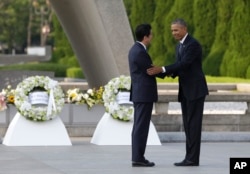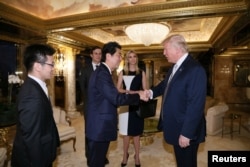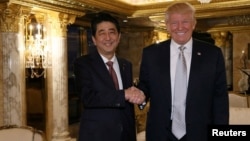What is billed as the last big gathering of survivors of the Japanese attack on Pearl Harbor takes place Wednesday in Hawaii — 75 years to the day after the bombing which brought the United States into World War II.
Another poignant and historic event will occur 20 days later at the naval base, when Shinzo Abe becomes the first Japanese prime minister to visit the memorial dedicated to more than 2,400 military personnel and civilians who died in the aerial raid. But those who expect Abe to apologize are likely to be disappointed.
"The purpose of the upcoming visit is to pay respects to the war dead, not to offer an apology," Chief Cabinet Secretary Yoshihide Suga said Tuesday in Tokyo.
Six months ago, U.S. President Barack Obama became the country's first sitting leader to visit a memorial in the Japanese city of Hiroshima, where in 1945 the United States detonated the world's first atomic bomb intending to end the war.
Abe is scheduled to visit Hawaii December 26-27 and go to the site with Obama, who spent part of his childhood in the state. "This visit is for the sake of consoling the souls of those who died in the war, not for the sake of an apology," Suga said.
U.S.-Japan alliance
The Japanese prime minister, who visited U.S. President-elect Donald Trump last month in New York, is concerned about a possible weakening of the U.S.-Japan alliance under the new administration, according to Koichi Nakano, professor of Japanese politics at Tokyo's Sophia University.
"So he is doing all he can to send signals that U.S.-Japan relations are strong and indispensable," Nakano told VOA.
During his campaign, Trump at times criticized Japan and other nations where the U.S. plays a role in security and bases troops. Trump asserted that those governments should shoulder more of the cost.
Grant Newsham, a senior research fellow at the Japan Forum for Strategic Studies, said Trump's win in November "has really thrown the Japanese for a loop."
Candidate Trump’s statements “suggesting that Japan was not doing enough for its defense and not paying enough for the services effectively of U.S. forces really frightened the Japanese government," Newsham told VOA.
"Japan once erred and challenged the emergent U.S.-centered international order, but has since repented and is now serving the international order as a good sidekick of the U.S.," said Professor Nakano in Tokyo. "The irony is that Abe at heart doesn't believe any of it, and now he is met by Trump, who doesn't believe any of it either."
The strengthening of the U.S.-Japan military alliance has been justified in recent years as crucial to maintain the liberal international order, Nakano told VOA. "And the entire logic is now bankrupt as neither of the two leaders of the alliance will be a liberal, so God knows where the U.S.-Japan alliance will drift to."
Asians look for apology
Abe's words at Pearl Harbor "will be very closely parsed, as are all statements by high Japanese officials about the war," said senior fellow Denny Roy at the Hawaii-based East West Center. "I would like to hear some kind of recognition that it was an act of aggression for Japan to attack Pearl Harbor."
But many of Abe's supporters "don't want him to apologize or say anything near an apology," Roy told VOA.
Japanese and American citizens will not be the only ones monitoring Abe's statement, which he will deliver while standing beside Obama.
Aggrieved Asian peoples "would like a strong apology for issues involving their countries," Roy explained.
"Prime Minister Abe, regardless of what he may believe personally and privately, has fully accepted the official Japanese government's view on these issues," Yuki Tatsumi, senior associate for East Asia programs at the Stimson Center, told VOA.
Remorse and apologies have been expressed to other countries by various Japanese prime ministers since the 1950s.
Tatsumi, who served as a special assistant for political affairs at Japan's embassy in Washington, expects Abe's Pearl Harbor remarks "to be very similar to the speech he gave to the U.S. Congress in April 2015 to remember the terrible history of Japan's conduct in World War II and to reaffirm Japan's commitment of not resorting to war to resolve international disagreements."
"Apologies are not necessary," according to Tetsuo Kotani, senior fellow at the Japan Institute of International Affairs.
Abe, he said, only needs to express remorse for those who suffered and died in the human tragedy and express a sincere commitment to peace.
Both Tatsumi and Kotani tell VOA that this aspect of history remains politicized in China and Korea — which were occupied by Imperial Japan — while the United States and Japan are setting an example of true reconciliation.
The Hawaii visit by Abe will be an "appropriate complement to President Obama's visit to Hiroshima this summer. The message is that Japan acknowledges its past, and that it is ready to move forward," said retired U.S. Air Force Brigadier General Dave Stilwell.
More than 2,300 U.S. servicemen were killed in the Japanese aerial attack at Pearl Harbor, which sunk the USS Arizona battleship while damaging or destroying 20 other ships and 164 planes. The attack will be marked Wednesday by a remembrance ceremony and a moment of silence at 7:55 a.m., when the Japanese planes first struck their targets.
Three and a half years later, the world war came to an end after the U.S. dropped atomic bombs on Hiroshima and Nagasaki, killing 210,000 people in the two attacks.
VOA’s Victor Beattie contributed to this report.








